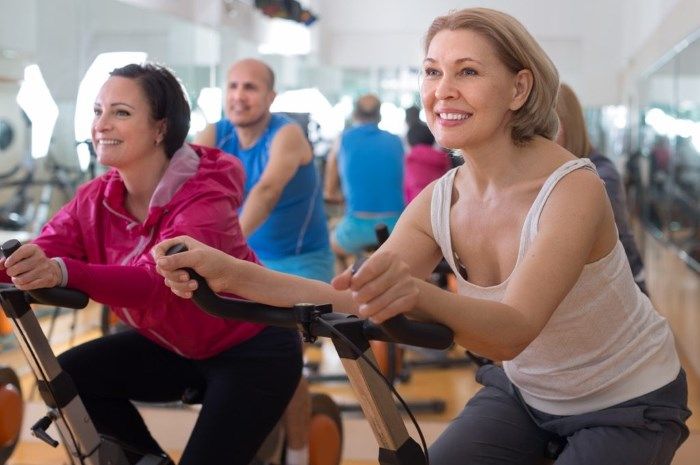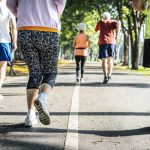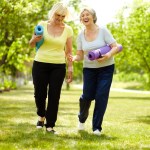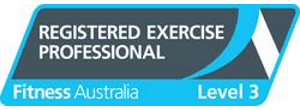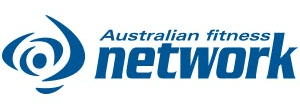Feel Younger and Stave Off Old Age with Exercise
Health benefits of exercise are indisputable in combating age-related risks for disease and disability, however research shows one type of workout can make the biggest difference, especially as you get older.
Getting old sucks.
Your joints creak. Your shoulders and knees make wonderful little popping noises. You do this groaning thing when try to roll out of bed that you never thought you would make. If you lie on the floor for a while, getting back up is no longer automatic; it's a process. Things are happening to your body, both outside and inside. Yay!
Fortunately, some of what's happening on the inside can be mitigated or even reversed, although, as with most worthwhile results, doing so isn't easy.
Researchers have found that various types of exercise - in particular high-intensity interval training - appear to slow down aging on a cellular level.
High-intensity interval training or “sprints” can be done on any type of aerobic equipment or outside, and involves short bursts of intense aerobic activity within any longer duration of moderate-to-vigorous physical activity
Researchers conducted an experiment on men and women divided into two groups: Half were below 30 years old, the other half over 64 years old. Everyone involved in the study was healthy but basically sedentary. Participants were then given different exercise regimens to follow for 12 weeks.
One group did not exercise. Another group alternated riding stationary bikes for 30 minutes at a moderate pace on some days, lifting light weights on others. The third group lifted heavy, and the fourth group did strenuous interval training on a stationary bike: They pedaled hard for four minutes, rested for three minutes, then repeated the cycle for a total of four intervals.
What happened? The control group, did not improve. Everyone else made improvements in overall fitness.
That's no surprise: Good things happen when we exercise.
The participants who lifted weights showed an increase in strength and muscle mass, with those lifting heavier weights showing greater increase. The participants who rode stationary bikes showed an improvement in cardiovascular fitness and those who did intervals showed a much greater increase in endurance.
Again no surprise, but here's what you might not know.
As we age, our muscle cells deteriorate. They don't regenerate as easily as when we're young, plus we lose mitochondria, which is where our energy comes from. To make it worse, the mitochondria that do remain get weaker.
Another yay.
But here's the good news. Research showed that those who did high intensity interval training experienced changes that increased both the amount and the health of their mitochondria - especially for the people in the older age group.
"Based on everything we know, there's no substitute for these exercise programs when it comes to delaying the aging process. These things we are seeing cannot be done by any medicine. . . . exercise is critically important to prevent or delay aging."
"It seems as if the decline in the cellular health of muscles associated with aging was 'corrected' with exercise, especially if it was intense. In fact, older people's cells responded more robustly to intense exercise than the cells of the young."
So what does all that mean?
No matter what your age, any form of exercise is good for you. If you want to get stronger and improve muscle tone, lift weights. If you want to turn back the clock, at least at a cellular level, do interval training two or three times a week.
That means, of course, that you can't just spin lightly on an exercise bike. You can't just breeze along on the elliptical. You can't just knock out twelve reps of dumbbell bicep curls with a 1kg weight while you check your email with your free hand.
You have to go hard.
Yes, it will hurt. It's supposed to. But "pain" is relative. If you haven't been exercising at all, mixing in a few 30-second jogging intervals during a 20-minute walk will hurt--and will help you get in better shape so that down the road you'll be able to do even more.
If you haven't been exercising at all, doing intense exercise will hurt--however will help get you in better shape so that down the road you'll be able to do even more.
Improving you is all that matters. Start from where you are, and work on improving that. Improvement, any improvement, is success.
You don't have to become an elite athelete.
Your only goal is to be a better you. The goal is to go well beyond what feels comfortable. Your muscles need to burn. Your lungs need to burn. If it's not hard--then you're not doing intervals.
And if that kind of effort doesn't sound fun, think of it this way. In every other aspect of your life, you try to optimize the outcome; you try to be as efficient and effective as you can with your time. Shouldn't you take the same approach when you work out?
Age has its way with all of us, but we can definitely slow down the process with intense interval training and exercise.
Science says so.

